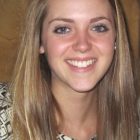 Anna Asendorf
Anna Asendorf
7th grade teacher in a low-income school district in San Antonio, Texas
B.A. Journalism and Chinese, 2012
What was the most important lesson you learned from the Commons experience?
Madison Commons was one of the best journalistic and overall college experiences I had at UW-Madison because it helped me understand the greater purpose I serve as a future journalist and citizen.
Madison Commons provided an invaluable outlet for me to grow my skills as a journalist; but more importantly, the news organization helped me grow as a citizen of Madison. Madison Commons’ goal to cover issues important in the community pushed me to discover the serious issues and exciting triumphs of the greater Madison community outside the walls of the university. Madison Commons gave me the important purpose of pursuing significant stories in the community, but the freedom to also find the stories that were meaningful to me.
If you think it had some effect, how did the Commons have helped start your career?
As a reporter, I spent much of my energy focused on covering the Madison school district’s achievement gap proposal and its community meetings during the winter and spring of 2012. I was, and still am, very passionate about the achievement gap, as I am now a 7th grade teacher in a low-income school district in San Antonio, Texas. During my time reporting on education and transportation issues, Madison Commons opened my eyes to the potential for media organizations to serve a function beyond the typical role of connecting local citizens to daily news.
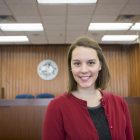
Abby Becker
City/county government reporter for the Capital Times in Madison
B.A. Journalism with a focus in reporting, Digital Studies Certificate
Previous positions: Intern for the Wisconsin Center for Investigative Journalism
Stories or projects since graduation you are proud of or that have made a difference: While reporting on the Park Edge/ Park Ridge neighborhood on Madison’s west side, I found out about a condominium complex facing an inordinate number of building inspection complaints and police calls. Residents were putting up with their frustrations because they were not sure whom to turn to with their concerns. I was able to highlight the building’s problems in context with Madison’s tight housing market and raise awareness of the building to local elected officials.
What was the most important lesson you learned from the Commons experience?
The Commons taught me to appreciate hyperlocal reporting not only as a reporter but as a consumer of news. There is a lack of focused coverage at the local level, and the Commons seeks to address that in Madison. My favorite Commons stories to work on centered on the achievement gap in Madison and were published in the Bridging the Gap project.
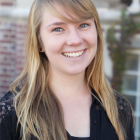 Melissa Behling
Melissa Behling
Producer, WISC-TV / News 3
B.A. Journalism, Digital Studies Certificate, 2017
If you think it had some effect, how did the Commons have helped start your career?
Reporting at Madison Commons gave me the confidence to pursue stories I had no prior knowledge about. It got me out of my comfort zone of the UW campus and encouraged me to form important connections with community members, igniting my passion to help amplify their concerns. It gave me the flexibility to work on both written and video stories — experience that had a direct impact on my transition into the television news world. The one-on-one feedback with editors at the Commons gave me published work I was proud of and could use as work samples for job applications.
What was the most important lesson you learned from the Commons experience? What was your favorite/highest impact story you covered?
I did a documentary tribute to Madison's Oscar Mayer plant that was forced to end production after nearly a century. After Oscar's highlighted some of the workers who dedicated years of their lives to the company and helped capture what the Oscar Mayer legacy meant to them. It was really powerful to be able to show the community the true impact of the closure (not just the economic repercussions) through the employees' eyes.
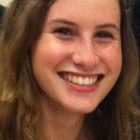 Alison Dirr
Alison Dirr
City-county government reporter, Milwaukee Journal Sentinel
Previous employment: Crime and justice reporter at the Appleton Post-Crescent; Public safety reporter at the Wausau Daily Herald; Frac sand mining intern/reporter at the Wisconsin Center for Investigative Journalism
B.A. Journalism and Political Science, Honors in liberal arts, 2013
Previous employment: Public safety reporter at the Wausau Daily Herald; Frac sand mining intern/reporter at the Wisconsin Center for Investigative Journalism
Awards or other recognitions:
- Wisconsin Newspaper Association: First place, Open Records/Freedom of Information Act reporting (2015)
- State Bar of Wisconsin: Golden Gavel commendation award (2015)
- Milwaukee Press Club: Best Business Story or Series (2014)
- Region 6 Society of Professional Journalists Mark of Excellence Award (2012, 2010)
Stories or projects since graduation you are proud of or that have made a difference: The highest profile coverage I’ve done is on the cases featured in the docu-series "Making a Murderer." It’s been interesting to dig into such a controversial, high-profile case.
I worked hard on stories covering the issue of domestic violence, highlighting a series of cases in which women lost their lives in the Fox Cities. In one in particular, I used public records to detail how a murder-suicide came to pass in public view (https://www.postcrescent.com/story/news/crime/2018/08/13/appleton-murder-suicide-robert-schmidt-escalated-10-days-assault/810055002/) and to explain how the husband, who wasn't allowed by law to possess a gun, managed to obtain one by simply going online. (https://www.postcrescent.com/story/news/crime/2018/09/19/guns-harrison-murder-suicide-azana-shooting-found-same-website/1224081002/)
I've also done stories that involved significant data and/or records gathering. In the story, Gunfire leads to fatal shot by officer (5/31/2017), we followed up with a what we know/don’t know story, which included a question about whether the person killed was actually the shooter. It turned out he was an innocent bystander.
With another UW-Madison grad, I spent many, many hours compiling records into a spreadsheet to get the numbers in this story: Suicide attempts rise sharply at Outagamie jail (5/26/2017).
What was the most important lesson you learned from the Commons experience?
While at the Commons, I reported/edited on the education beat, a completely new subject area for me. It gave me a good taste of what beat reporting means day-to-day, which is invaluable to me as a reporter now. Also, hyper-local reporting teaches reporters how to build sources and dig deep into the community they’re covering. That’s where you’ll find the best stories.
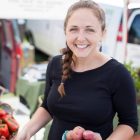 Emily Eggleston Toner
Emily Eggleston Toner
Urban Agriculture Educator, Purdue Extension - Marion County (Indianapolis)
M.S. Geography, 2012; M.A. Journalism 2013
Projects since graduation you are proud of or that have made a difference: In my role as urban agriculture educator for Purdue Extension, I connect new, small-scale diversified farming businesses and non-profit initiatives to one another, to their communities, and to technical assistance. Two projects I am most proud of are:
- Design, development and delivery a new Urban Agriculture Certificate program that uses a hybrid online and classroom learning approach. The curriculum includes 50+ short videos, 25 learning modules and a very interactive approach to learning.
- Envisioning and building an Urban Farm Incubator Network that supports new urban farm and garden projects by drawing them into a environment where they can build relationships and generate social capital for their community and their work. To date the project has supported 15 urban farms and continues to expand.
How did the Commons help start your career?
Madison Commons helped me dig into and understand community dynamics in a way that was unique during my time in journalism school. I learned why Supplemental Nutrition Assistance Program (SNAP) recipients were only just returning to farmers markets. I visited an elementary school's international food festival. I spoke with neighbors who built a community garden as a way make their park a safer space in the face of gun violence.
I would not have gained this understanding while in graduate school if not for Madison Commons pushing me to dig into hyperlocal stories. They are stories I remember today and that have continued to shape my understanding of community, even as I make a life outside of Wisconsin.
 Susan Endres
Susan Endres
Assistant editor of the Monroe Times
B.A. Journalism and English, Certificate in European Studies, 2013
Projects since graduation you are proud of or that have made a difference: I helped keep the Monroe Times afloat during a turbulent time. We went through a change in leadership, with both the editor and assistant editor leaving, while simultaneously transitioning to all-new computers and software. I was the one left in charge to make sure we had a paper to publish every day.
How did the Commons help start your career?
Besides giving me clips to use on job applications straight out of college, I credit the Commons with helping me get promoted to my current position. After the paper was bought by Morris Multimedia, the new publisher was talking to me about his plans for the paper and I mentioned wanting to do more hyper-local reporting, which I had done with the Commons. That was exactly the direction he wanted to take.
What was the most important lesson you learned from the Commons experience?
The most important lesson I learned from the Commons was how rewarding it is to write about good people doing good within their communities and giving recognition where it might have otherwise been lacking. It was also valuable to learn how to come up with story ideas and pitch them during newsroom meetings. It's really tough to pick a favorite story, because I enjoyed so many of them.
 Scott Girard
Scott Girard
Assistant Editor, Unified Newspaper Group
B.S. Journalism and Political Science, 2013
Projects since graduation you are proud of or that have made a difference: The project I'm most proud of is launching a Spanish-language newspaper through my company to reach the 500-plus Spanish-speaking families in the school district I cover. Some more information can be found here on page 4: https://www.scribd.com/document/349313335/VP0525
While there are many stories I'm proud of, nothing compares to reaching a group of people that previously had no access to news about their local school district.
Awards or other recognitions:
- Wisconsin Newspaper Association: “Future Headliner”; Second Place, Ongoing/Extended Coverage (School Discipline Policies series), Group E; Second Place, Artistic or Portrait Photo, Group E; Third Place, Schools Reporting, Group E (2016); Second Place, Feature Writing, Group E (2015); First Place, Spot News Photo, Group E; First Place, Feature Writing, Group F (2014)
- Association of Free Community Papers: Third Place, General Excellence (2016); Honorable Mention, Best Original News Story (2015)
How did the Commons have helped start your career?
The Commons offered me an early look into hyperlocal journalism and its value. It also provided a bridge from my graduation in May 2013 to beginning my first job in September, allowing me to keep my reporting, writing and planning skills fresh for starting my job.
What was the most important lesson you learned from the Commons experience?
That people care about what happens in their neighborhoods and communities. The best way to find those stories is to talk to the people you want to read them, ask them about their life and interests and go from there. Simply talking to people can be challenging in today's digital-focused journalism world, but its value remains high.
What was your favorite story you covered?
I really enjoyed this story about the history of Breese Stevens Field, which even as a native Madisonian I did not know.
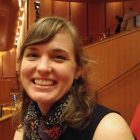 Nora Hertel
Nora Hertel
Government/Taxes Watchdog Reporter for the St. Cloud Times
M.A. Journalism and Mass Communication, 2013
Previous employment: Public Issues Investigator for the Wausau Daily Herald; Legislative Relief Reporter for the Associated Press in South Dakota; Wisconsin Center for Investigative Journalism Intern
Projects since graduation you are proud of or that have made a difference:
- Child sex-abuse victim finally gets justice
- How a genetic test for Huntington’s disease could change our plans for children
- 72 hours in the psych unit and the aftermath
Awards:
- The Women's Community: Award for outstanding achievement in supporting sexual assault victims (2017)
- Wisconsin Newspaper Association: First place, Education reporting (2017); First place, Special projects; Second place, Local government reporting (2016)
- Wausau Region Chamber of Commerce: Finalist for the Athena Young Professional Award (2016)
If you think it had some effect, how did the Commons have helped start your career?
My time at Madison Commons absolutely launched my journalism career. It helped me build my portfolio, report on different beats and learn to edit and manage a team of reporters. Madison Commons led me to internships that led me to the investigative positions I have worked in for the last five years.
Even though I cover large issues now, Madison Commons instilled the value of community-level reporting. People experience every issue (state, local or national) at the community level, in their neighborhoods.
 Kait (Vosswinkel) Hoehne
Kait (Vosswinkel) Hoehne
Full-stack JavaScript Developer
B.A. Journalism, 2014
Previous employment: Online Editor for Wisconsin Public Television; Multimedia Producer for WNET (New York Public Television)
Stories or projects since graduation you are proud of or that have made a difference: Inspiring Woman is a year-long multimedia campaign for American Masters that crossed platforms and mediums. Along with planning and coordinating the campaign, I produced, shot and edited the six-part web series featuring women who are making changes in their respective industries.
If you think it had some effect, how did the Commons have helped start your career?
The Commons gave me so much confidence and made me feel comfortable in the world of reporting; it not only gave me a strong portfolio an idea of what to expect in future jobs but also gave me incredible friends and mentors. The relationships I built during my work at the Commons were some of the most important to me as I started my career.
Whether I was shooting photos, making a video, or writing a article, I really enjoyed being able to talk to different groups of people across the city. That's still one of the first things I look for in a job: will it help me broaden my perspectives, meet new people, and experience a different point of view?
 Steve Horn
Steve Horn
Senior Copywriter at Digitas
B.A. Journalism and Political Science, 2014
Previous employment: Tom, Dick & Harry Creative Co.; Planet Propaganda
How did the Commons help start your career?
The Commons gave me my best hands on, on the ground, person-to-person reporting experience of any class in the J-School. I was able to practice interviewing, and communicating well in general, on a daily basis.
What was the most important lesson you learned from the Commons experience?
It’s worth noting that I reported in my childhood neighborhood in Madison for the Commons. And because of it learned things about my hometown and my neighbors that I would have never known.
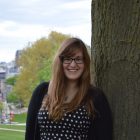 Maija Inveiss
Maija Inveiss
Digital Content Editor at Madison Magazine
B.A. Journalism and French, 2017
Stories or projects since graduation you are proud of or that have made a difference: Starting late last year, I’ve gotten to have my own monthly column in the print magazine. It features lifestyle stores, their owners and the products you can find there. It’s easily my favorite monthly project. I love getting to find out about the ins and outs of the stores. I also work on cover and feature story projects.
How did the Commons help start your career?
The Commons really taught me how to look for stories. I had worked for a couple different publications, and it was all about breaking news and getting out a quick story. With the Commons, I actually had the time to take a deep dive into the stories and get to know people in the community. Madison Commons contributed heavily to my love of journalism. It confirmed that I was doing the right thing with my future. A lot of the skills I attained in Madison Commons are applicable to my current career.
What was the most important lesson you learned from the Commons experience?
I learned that the smaller stories can be the most important and most impactful. People need to know what’s happening in the community and it’s our job as journalists to write about those stories.
What was your favorite story you covered?
My favorite story was about DreamBikes. It’s an organization that provides opportunities for high school students, especially low-income students. I loved talking with the assistant manager of the store because he was so passionate about his work. He had worked there for a couple years, and he was going to be promoted at the new location. It took forever to track down the story, but once I talked with them and wrote the story, it was so worthwhile.
Elizabeth Janeczko
Curriculum and Instruction Specialist at Uplift Education, Dallas, Texas
M.A. LaFolette School, 2018

What was the most important lesson you learned from the Commons experience? Working as an education reporter for the Madison Commons gave me a perspective on the education system I was unable to obtain as a policy researcher or as a teacher. It gave me the opportunity to understand how education and the people involved in every stage of teaching and learning are understood by those who do not work in classrooms. Even though I have substantial education experience, I learned what it felt like to be an outsider in a world I was deeply tied to. As I work to improve access to education for all children, my work as a reporter helped me understand how important it is to elevate the conversation around policymaking through storytelling. Working for the Madison Commons was a dream come true because of the chance to pursue my own interest in how narratives drive policymaking. But I also learned that my own pursuit of interviews elevated some voices and ignored others, and that journalists hold enormous power over whose truth is portrayed.
What was your favorite story you covered? I learned so much about Madison, about education, and about the legacy of systemic injustice when I wrote about EROs. That story gave me the chance to talk to so many people with such divergent perspectives and demonstrated the power of that narratives have over people. What’s more, it gave me hope that incremental policy change can be effective. I don’t think I’ll ever really be done with that story; I wrote three final essays during my last year of graduate school on the topic and remain tuned in to the story’s developments as I leave Madison after graduation.
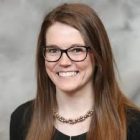 Hannah Kiddoo
Hannah Kiddoo
Media Writer at The Missouri Bar & Contributing Writer at JeffCityBlog.com
M.A. Journalism, 2012
Previous employment: Assistant Editor, Texas Bar Journal, 2013-2015
Stories or projects since graduation you are proud of or that have made a difference:
- Important Work To Be Done Thanks to Texas Lawyers for Texas Veterans clinics, attorneys across the state take on pro bono cases that change lives.
- Justiceville, U.S.A. LRE’s newest initiative teaches kids about citizenship, geography, and government
- SXSW 2015: Drones and Privacy
How did the Commons help start your career? What was the most important lesson you learned from the Commons experience?
Being part of the Commons team meant reporting on issues that were impacting the community--including matters that were being overlooked by others. I had strong published pieces to show prospective employers when I graduated, and I also had greater confidence in my ability to spot stories, conduct interviews, and write stories that educate others in a meaningful way.
My experience also made me a better citizen. Being exposed to various community groups and efforts solidified my passion for certain causes, and I have applied that through volunteer work wherever I live.
 Nakho Kim
Nakho Kim
Assistant professor of Communication at Penn State University Harrisburg
Ph.D. Mass Communication, 2015
Project since graduation you are proud of or that have made a difference: I helped relaunch the student newspaper Capital Times in fall 2016, drawing on the theme-based approach and civic perspective focus I learned at Madison Commons.
How has the Commons helped with your career?
I draw on the Commons when designing assignments for journalism and media sociology classes. These include writing local community profiles, researching community issues by tapping into local media and public data, and self-reports on news consumption to sketch out an ego-centric news ecology.
What is the most important lesson you learned from the Commons?
A public sphere emerges through tangible common public interests, which works best in the context of the local community. Successful public discussions move quickly outside of the original media that sparked it. An information commons plays a crucial role in providing a community-specific, civic perspective while also connecting different strands of information together.
 Mario Koran
Mario Koran
Reporter at Voice of San Diego
M.A. Journalism, specialization in race and class, 2013
Stories or projects since graduation you are proud of or that have made a difference: Since I graduated I've written a number of stories that have led to impact. As an intern at the Milwaukee Journal Sentinel, I wrote a story about a podiatrist who would trick patients into believing their insurance covered his medicals costs, knowing they wouldn't. Later that summer he was forced to repay the patient he defrauded and his license was suspended.
At Voice of San Diego, I wrote a story about a student who suffered a brain injury after his coach pressured him to return to a football game. That story led to changes in concussion protocols in the school district.
In 2016, my series on the former school board president's attempt to defraud the district of $250,000, among other problems I unearthed, led to a criminal conviction for the school board trustee and got her booted from the school board.
I also wrote big story about a suspected rape at one high school and the school's apparent attempt to cover it up.
Awards or other recognitions:
- Society of Professional Journalists, San Diego chapter: Journalist of the Year (2016)
- New America: New America CA Fellow (2016). This fellowship allowed me to led a project to help multilingual families better engage with schools.
How did the Commons help start your career? What was the most important lesson you learned from the Commons experience?
The seeds of my whole career thus far were planted during my time on the Madison Commons. The Commons allowed me to work on the stories I cared most about -- those relating to race and class -- and focus on things like the achievement gap and mass incarceration. Those are huge topics, of course, but at the Commons I learned to break them into questions and drive at the answers through reporting. More than that, the Commons, and Lew, frankly, encouraged me to embrace the values of a journalist: getting out into the community, knowing the community and what matters to them, and delivering reporting that has value to the people living and working in neighborhoods.
I still remember and think about many of the things Lew would tell us. Things like: "You know you're doing your job as a reporter when you no longer have to look for stories -- people come to you." I still look for stories often, of course, but that piece of advice is a great ideal to work toward. And I have to say, over the last five years I've seen and appreciated the truth in this advice.
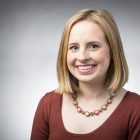 Trina La Susa
Trina La Susa
Assistant Editor, Cheese Market News
B.A., Journalism and Strategic Communication, Sustainability Certificate, 2018
Awards or other recognitions:
- Outstanding Circle-K Bulletin Editor - Regional award from Wisconsin-Upper Michigan District (2016)
- Outstanding Contribution Award – WSUM 91.7FM Student Radio (2018)
How did the Commons help you start your career? What was the most important lesson you learned from the Commons experience?
The Madison Commons gave me the freedom to research and pitch environmental stories in the community that I found important, and the power to put my work forward on a respected platform. The whole staff always encouraged my ideas and creativity, which allowed me to produce a portfolio of stories I am passionate and proud about.
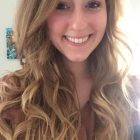 Samantha Loomis
Samantha Loomis
News Assistant at Agri-View
M.A., Journalism, 2017
Previous employment: Newspaper Page Designer at the Madison Design Center
How did the Commons help you start your career? What was the most important lesson you learned from the Commons experience?
The Commons was a great, great start to get some stories published and to experience someone editing my stories. Meredith, managing editor at the time, taught me a lot about how to keep my writing tight and concise. I think every student should be required to write something for the Commons, just to get the experience of someone else editing your story and getting clips published.
 Franco Latona
Franco Latona
Media Coordinator, Peace Corps Senegal
B.A. Journalism, 2014
How did the Commons help start your career? What was the most important lesson you learned from the Commons experience?
I think my time with the Madison Commons absolutely helped me land my job as Media Coordinator for Peace Corps Senegal. The Commons gave me the flexibility to cover a wide range of stories on many different topics. From a feature story on a unique nursing home to a simple piece about permitting dogs in Madison city parks, the Commons enabled me to practice and improve my reporting and writing skills. I also had the help of then-managing editor Mike Mirer, who was a fantastic editor.
I'm truly grateful for my time with the Commons. The reporting was challenging but really engaging and fun, and I would recommend all students or recent graduates who are interested in improving their journalism skills to join.
 Cara Lombardo
Cara Lombardo
Reporter for The Wall Street Journal
M.A. Journalism, 2016
Previous employment: Legislative relief reporter for the AP, intern at the Wisconsin Center for Investigative Journalism and the Milwaukee Journal Sentinel
Stories or projects you are proud of or that have made a difference:
As an intern at the Milwaukee Journal Sentinel, I broke the story of an inmate dying of dehydration in the Milwaukee County Jail, which resulted in jail employees and a health-care contractor being criminally charged and a civil suit from the inmate's estate.
At The Wall Street Journal, I broke the news that Bacardi was buying Patrón tequila and, using public record requests, wrote about the increasing role cash plays when states compete for large employers.
Awards or other recognitions:
- Richard H. Driehaus Foundation Awards for Investigative Reporting: Finalist (2017)
- Society of Professional Journalists, Sigma Delta Chi: Investigative Reporting (Independent) (2016)
- Milwaukee Press Club: Best Investigative Story or Series finalist; Best Investigative Story finalist (2016)
How did the Commons help start your career?
The Commons editorial meetings prepared me to work in newsrooms. Through those meetings, I learned how editors and reporters work together to pitch stories, fine-tune ideas and tackle reporting challenges. The key lessons I learned from the Commons are to go out and talk to people and get as much experience as possible, no matter how minor. The very first thing I did at the Commons was drive to a Humane Society fundraiser to take photos of dogs in Halloween costumes. It seems trivial, but it was my first experience covering an event and walking up to people to interview them. Within a few months, I was reporting an enterprise piece about competing visions for the future of Madison's Northside. That article and other work with the Commons helped me get valuable internships, setting off a chain of experiences that allowed me to become a professional journalist.
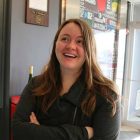 Hannah McClung
Hannah McClung
Assignment and Digital Operations Editor at WISC-TV
B.A. Journalism, 2011
Previous employment: News Editor at Channel3000.com; News Editor and Nightside Assignment Editor at WISC-TV and Channel3000.com
Awards or other recognitions:
- Edward R. Murrow: Best Website, Channel3000.com (2014, 2016); Overall Excellence, Small Market Television (2016)
- Regional Emmy: Interactivity (2015, 2016)
How did the Commons help start your career?
The Commons got my story on the front page of Channel3000.com...so it was always a goal of mine after that to work for C3K!
What was the most important lesson you learned from the Commons experience?
The most important lesson I learned was that digital journalism is the future. Before the Commons, I was a print-focused journalist and didn't think being published online was as good. Working with the Commons made me realize that digital journalism was the future and that being published online and first is extremely important.
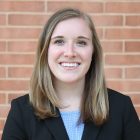 Gretchen Miron
Gretchen Miron
Assistant Director of Executive Affairs at the NCAA
B.A., Journalism and History, 2015
Stories or projects since graduation that you are proud of or that have made a difference:
I don't write stories a lot anymore, but I did write a few pieces for several of the award honorees that we feature each year at our different events. They focused on various former student-athletes who have excelled in their careers and communities since graduating. They're inspirational stories and help encourage current student-athletes to pursue various careers or fields upon graduation, which hopefully makes a difference in their lives. I'm also involved with many of the NCAA's sexual violence prevention efforts, which is a main passion of mine.
How did the Commons help start your career?
When I started journalism classes I had no clue what I wanted to do. Writing for Commons was an opportunity to do reporting for the first time and see if it was something that I liked. I enjoyed getting out into the Madison community and learning about new things going on.
Interviewing and putting myself "out there" at 18 was something that I do think has led to me success in other journalism courses while in college and in my career. It was also my first "real-world" experience with a deadline, which I am forever grateful for.
 Nayantara Mukherji
Nayantara Mukherji
Planning Director at Saatchi & Saatchi
M.A. Journalism, 2012
How did the Commons help start your career?
The journalism and editorial skills I learned were key to my getting a job at WPR, which in turn got me a position at NPR, which in turn led to my current career. I've spoken about the Commons in every interview I've ever done. On a very fundamental level, the Commons gave me my first real taste of responsibility--to an institution, to the community, and to the individuals I worked with.
Specifically, the Commons taught me three sets of skills that I've found set me apart in the workplace.
First, being proactive and taking initiative. One of the things I'm proudest of the Commons for was that unlike a number of other smaller news outlets, we didn't rewrite and publish press releases. We proactively sought out stories; the community itself was our source. That commitment to proactively taking initiative has set me apart in all my jobs.
Second, as managing editor, I learned how to manage a group of people with varying skill, experience, and passion levels. Our reporters came from a variety of backgrounds, and I worked with all of them. I learned a lot about motivating each one differently, and giving them the space to explore their passions while still staying true to the mission of the Commons and upholding standards of journalistic integrity.
Third, I learned to listen to other people. In addition to our reporters, the Commons was committed to working with anyone who wanted to express a voice about Madison. We brought community groups into the site, and figuring out how to give them an independent voice while still maintaining our standards was one of the most fascinating and challenges tasks I dealt with.
What was your favorite story you covered?
I'm proudest of our series on poverty and community gardens. The first, because it told authentic stories of people most people (including myself) would never have encountered without the Commons, and the second, because it exemplified in many ways what makes Madison so unique. On the surface, it would seem that one community garden should be very much like the other, but our reporters were able to really to bring out the diversity of missions, cultures, and methodologies in the system.
Yilang Peng
PhD Candidate at the Annenberg School for Communication, University of Pennsylvania
M.A. Communication, 2014
Stories or projects since graduation you are proud of:
- Peng, Y. & Jemmott, J. (2018). Feast for the eyes: Effects of food perceptions and computer vision features on food photo popularity. International Journal of Communication, 12, 313–336.
- Peng, Y. (2017). Time travel with one click: Effects of digital filters on perceptions of photographs. In Proceedings of the ACM Conference on Human Factors in Computing Systems (pp. 6000–6011), New York, NY: ACM.
What was the most important lesson you learned from the Commons experience?
During my time at Madison Commons, I developed an interest in computational journalism, data visualization, and programming. I have combined this interest with my research at Penn and started to explore how to apply computational methods in communication research.
 Becca Radix
Becca Radix
Communications and Marketing Intern, Mercy Corps Nepal
B.A. Journalism and Communication Arts, 2016
Previous employment: Communications Assistant, Blumont, Inc.
Stories or projects since graduation you are proud of:
My biggest project to-date is a microsite about Blumont's U.S. Gov-funded programming in Kandahar, Afghanistan. Working closely with Blumont's team on the ground in Afghanistan, I put together a website to tell the story of the USG-funded Kandahar Food Zone Program in Afghanistan's Kandahar Valley. The program's aim is to address the drivers of poppy cultivation in the region. I was able to gather and curate loads of multimedia elements for the site, as well as highlight testimonies and stories of farmers and various other community members whose lives have been positively impacted by the program.
While this program has made an incredible impact on the Kandahar valley in some ways, it's also not without its shortcomings and certainly is not the holy grail of aid and development work in the region (nothing is, though). Despite the flaws, both this project and my work in the field of international development and humanitarian aid in general provide a deep sense of purpose on a personal and professional level.
I'm able to combine current world news and events with problem solving and storytelling, all while gaining greater understanding of different cultures and countries around the globe.
How did the Commons help start your career?
The Commons honed my writing and reporting skills, gave me a chance to dig in to grassroots and community-level issues (what a lot of my work today revolves around) and speak with individuals from a variety of backgrounds, which is still important to me and an aspect of my current work that I love as well.
What was the most important lesson you learned from the Commons experience?
I got over my fear of approaching strangers for quotes and information through covering various events for the Commons, and that has proven invaluable in my career thus far, whether networking, requesting meetings or looking for statements. Mastering the cold-approach with the right level of tact and assertiveness was something I first learned at the Commons!
What was your favorite story you covered?
It wasn't particularly high-impact, but my favorite story (Made With Care) was about Ben and Kate Lubchansky's community share kitchen just west of Madison. They run the business out of their cozy house in my hometown, and it was just such a treat to speak with them, to be in their presence (they are incredibly warm, kind people) and to see a real-life example of a long-time business dream made reality. They really are caring for the greater Madison community and the whole project was a joy to cover.
 Monay Robinson
Monay Robinson
Graduate Student at NYU and Production Intern at New York Public Radio
B.A. Journalism, 2017
Stories since graduation you are proud of: I went to DC and reported on how some low income families had difficulty receiving their food stamps. I also recently did a story about the public housing conditions in New York and how families went without heat and hot water sporadically throughout the winter.
How did the Commons help start your career?
The Commons was my first real-world experience in the field of reporting. I learned how to report! Since I was interested in doing stories about low-income housing in Madison while reporting at the Commons, I learned that fostering relationships with my potential subjects was really important; good reporting takes time to build trust and relationships with people. I also learned how to be resourceful and not to be afraid to ask questions.
What was your favorite story you covered?
I am really proud of my story about low-income housing that I wrote for the Commons, which I used for my grad school application and since then has inspired me to continue reporting on similar issues. For example, public housing is my beat in one of my classes, and I regularly reflect on how my first piece on housing was for the Commons.
 Ethan Safran
Ethan Safran
Editor at Publications International
B.A. Journalism and English, 2015
Previous employment: Web Producer at WGN-TV (Chicago); Media Relations Assistant at Tech Image (Chicago); Urgency Reporter at the Appleton Post-Crescent/USA Today Network-Wisconsin
Stories or projects since graduation you are proud of: In addition to a story I wrote about the annual inundation of lake flies around Lake Winnebago, I wrote two stories about a Fox Valley girl battling an undiagnosed skeletal dysplasia. In them, I tried to capture this girl's battle and the impression she made upon her family and community.
- Clayton girl's battle with dwarfism one-of-a-kind
- One of a kind: Surgical setbacks haven't dimmed Avi's spirits
Awards
- Wisconsin Newspaper Association: Second Place, Environmental Reporting Award, Division A; Honorable Mention, Breaking News Coverage, Division A (2016)
What was the most important lesson you learned from the Commons experience?
Get out and talk to people. The best way to learn about a community is by meeting its residents face to face. Don't try to conduct interviews by phone or, even worse, by email (except when absolutely necessary). A wealth of knowledge is possible when you sit down and look someone in their eyes and listen as they tell their story.
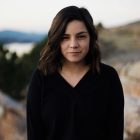
Lauren Ann Sklba
News 3 This Morning Producer at WISC-TV
B.A. Journalism with certificates in Gender & Women’s Studies and European Studies, 2017
How did the Commons help start your career?
Madison Commons was my first opportunity to pitch and report stories on my own. It was my first taste of reporting independent of the classroom setting. I loved being able to report on the impacts of the election right after it happened. Covering local immigration rights events and getting to know the people in the community that were being directly impacted by the election was my favorite Commons experience.
What was the most important lesson you learned from the Commons experience?
My time with Madison Commons taught me how to make connections, get sources and get involved in order to get the story. I learned how to navigate the inner workings of a community and the importance of having your own community of editors and reporters you can trust to critique and help better your stories. I learned how to salvage stories even when everything seemed to be working against me.
Most importantly, I think my time with the Commons affirmed in me that I am a good, capable and needed reporter. Without my time at the Commons, I would not have the confidence that I have today to navigate a career in journalism beyond the classroom.
 Mary Sussman
Mary Sussman
Contributor to the Shepherd Express
M.A. Journalism, 2013
Previous employment: Wisconsin Institute for Discovery, The Oregonian, Isthmus, Urban Milwaukee.
What was the most important lesson you learned from the Commons experience?
While working on Madison Commons, I saw some of the difficulties inherent in building an exclusively online audience without a legacy or co-existent print publication and maintaining sufficient staff writers. The Commons's ambitious goal of providing hyper-local news coverage to Madison's many neighborhoods was daunting. On the other hand, there was never a dearth of stories to cover. I was, however, consistently amazed that with a small staff we managed to publish as many stories as we did, providing coverage of underreported news.
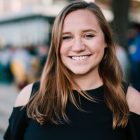 Lauren Thill
Lauren Thill
B.A. Journalism and English (Creative Writing), Certificate in Gender and Women's Studies, 2018
What was your favorite/highest impact story you covered?
My favorite stories to cover typically highlighted the importance of blending education and community, such as this piece about GameChangers and several about Simpson Street Free Press. I also loved covering the Board of Education candidate campaigns and debates. It was interesting to speak directly with the candidates, and I loved hearing voter questions during the debates.
What was the most important lesson you learned from the Commons experience?
I learned so many lessons while reporting on education for the Commons. Of course I learned practical lessons about journalism, but what amazed me time and time again was how much goes on in a community and how many people are working tirelessly to make their community a better and more equitable place to live.
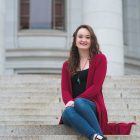 Claire Vanvalkenberg
Claire Vanvalkenberg
Feature writer and columnist for Student Independent News out of the National University of Ireland
B.A. Journalism with certificates in Digital Studies and Gender and Women's Studies, scheduled for 2019
What was your favorite/highest impact story you covered?
The story that always sticks out to me when I look back at my time at the Commons is an art exhibit called Artists in Absentia. The goal of the exhibit was to spread awareness of what life is like in the low-security prisons around Madison, and it was effective. The artwork was on display, but the artists were absent. Reporting on that story taught me about angles. The story was not really about an art exhibit, it was about complicating the attitudes around Madison incarceration.
What was the most important lesson you learned from the Commons experience?
The Madison Commons was a vital introduction to the School of Journalism and Mass Communications. The team of experienced reporters were willing to take me under their wing and show me what reporting was about before I was even accepted into the Journalism School. This early start was vital in my development as a writer and a reporter.
 Amelia Wedemeyer
Amelia Wedemeyer
Writer at The Walt Disney Company, Disney Digital Network.
B.A. Journalism, 2012
Previous employment: Reporter at the Winona Post
Stories or projects since graduation you are proud of or that have made a difference: At the Winona Post in Minnesota, I'd like to think my stories, especially the stories about their public schools, helped the town. It's a thankless job, but it was rewarding to know that my work benefitted students, teachers, and community members.
Since transitioning into entertainment writing/content, my most proud moment to date would be my "Which Chris Are You?" quiz, which Chris Pratt took (unprovoked, I swear). It caused a minor viral moment, which was really exciting.
Awards or recognitions:
- Minnesota Newspaper Association: Best Investigative Story (2014)
How did the Commons help start your career?
While I had worked on a few stories for the Badger Herald in college, Madison Commons was my first journalism experience that involved the larger public outside of the university. From an experience standpoint (and this may sound corny), the Commons felt like the first adult career experience for me; it was the first time I felt like I was working on something bigger than just UW-Madison.
Another great thing about the Commons was the access to amazing professors and grad students who could help us undergrads when needed.
I also think having MC on my resume has helped set me apart from other journalism students who were in PRSSA or worked on the student papers. Working on the Commons showed that I had broader journalistic interests and that I've taken the initiative to find something beyond the standard undergraduate journalism experience.
 Zachary Zaban
Zachary Zaban
Global Digital Associate Director at Starcom Worldwide (London)
B.A. Journalism, 2011
Projects since graduation you are proud of or that have made a difference.
- 2015 Superbowl – Always Like a Girl Digital Media activation/buying lead (https://www.youtube.com/watch?v=yIxA3o84syY ; http://www.huffingtonpost.co.uk/entry/always-super-bowl-ad_n_6598328 )
- Ecommerce lead for global CPG brand and consumer electronics brand
- Probono work for United Nations + World Wildlife Fund’s Earth Day
Awards or other recognitions:
- Effie: Bronze Winner - Tide's "Wash Away Labels" (2017)
- Facebook Ad Awards: Winner, Craft Category – Always #LikeAGirl (2015)
How did the Commons help start your career?
I was part of the initial social media team that helped launch some of the paid social channels for the Commons back in 2010/2011. The biggest learning experience for me was launching a new project/product from scratch without initial guidance or established process. The further I get into my career with advertising, the more that my leadership role requires me to begin workstreams, projects, and initiatives without a boss dictating all steps that need to get done.
What was the most important lesson you learned from the Commons experience?
Sometimes a product launch does not happen overnight and you have to wait through different versions/updates before the final output is ready for distribution.
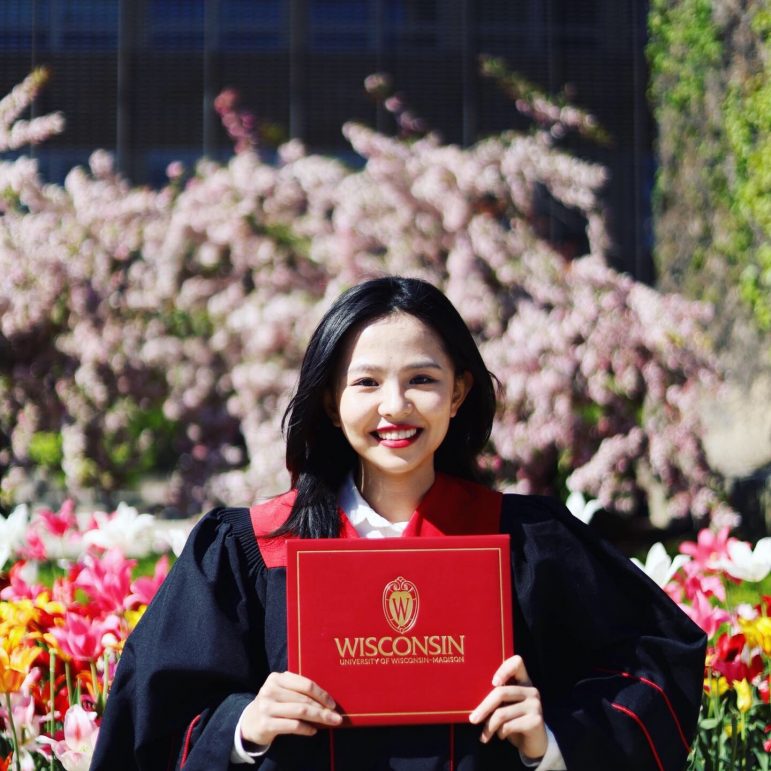
Defang Zhang
Graduate Student, Columbia Journalism School
B.S., Journalism, 2020
What was your favorite/highest impact story you covered?
I wrote my very first feature story with the Commons about how liberal arts graduates are experiencing career changes more frequently than STEM graduates. However, I discovered that liberal arts graduates might even outpace the average salary in their mid-career. It was exciting to spot a story and trace the driving factor behind it.
How did the Commons help start your career?
I worked on the Commons from summer 2019 to 2020, as a community reporter, covering topics from marginalized students' rioting on campus to a vaping store business in Madison. It was a fabulous adventure, pitching interesting ideas to the editor, interviewing all kinds of people and growing as a real journalist. I learned how important the photo is compared to the article and how important it is to have handful sources to compose a well-rounded report.
How did the Commons increase your understanding of community?
When I worked at Commons, I realized that Commons voices not only for students at UW but also for the Madison community. I learned to keep an eye on any community influencers surrounded, including social media stars and city officials. Covering stories for the city is similar to writing stories for the student newspaper, though; you must immerse yourself wholly into a much larger environment.

